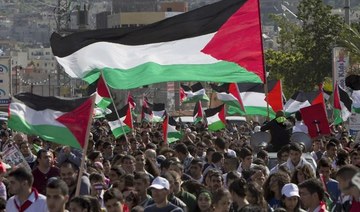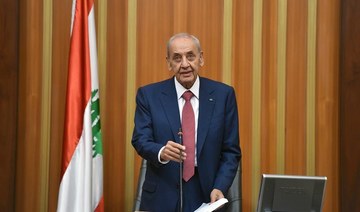JERUSALEM: The economic component of the Trump administration’s long-awaited Middle East peace plan drew chilly responses from regional allies Sunday, two days before it was to be discussed at a conference in the Gulf.
An Israeli minister called a major piece of the White House’s “peace to prosperity” plan “irrelevant,” while Jordan and Egypt restated their support for a political solution to the Israeli-Palestinian conflict, pouring cold water on Washington’s focus on economic issues.
The $50 billion economic plan, published on Saturday, calls for massive infrastructure projects and job creation for Palestinians. It makes no mention of Palestinian political aspirations — a state in the West Bank, Gaza Strip and east Jerusalem, lands Israel captured in 1967.
The plan does not address the core issues of the conflict: the contested holy city of Jerusalem, sought by both peoples as a capital; the fate of more than 5 million Palestinian refugees and their descendants; and the borders of a future Palestinian state.
American officials say these issues will not be raised at this week’s conference in Bahrain. Neither Israel nor the Palestinians will have official representation at the two-day summit. The US delegation is to be led by Treasury Secretary Steven Mnuchin.
Palestinian Finance Minister Shukri Bishara said on Sunday that Palestinians do not need this week’s US-led Bahrain meeting to develop their country, they need peace.
The June 25-26 conference in the Bahraini capital Manama, which the Palestinian Authority is boycotting, will discuss US-led proposals for an economic vision to be presented by US President Donald Trump’s son-in-law Jared Kushner, part of a wider plan to resolve the Palestinian-Israeli conflict.
While many Arab states are attending the meeting, the plan has drawn rebuke as an attempt to circumvent Palestinian demands for an independent state on lands captured in the 1967 war.
“We don’t need the Bahrain meeting to build our country, we need peace, and the sequence of (the plan) — economic revival followed by peace — is unrealistic and an illusion,” Bishara said on the sidelines of a meeting of Arab finance ministers in Cairo.
“First of all, give us our land and our freedom.”
While the precise outline of the political part of Kushner’s plan has been shrouded in secrecy, officials briefed on it say he has jettisoned the two-state solution that envisages an independent Palestinian state alongside Israel in the West Bank, East Jerusalem and Gaza.
Kushner told Reuters that the plan, previously dubbed the “deal of the century,” could be the “opportunity of the century” for the Palestinians.
In an address to Sunday’s meeting at the Arab League headquarters, Bishara cited the “bitter experience” of the Palestinians since the 1993 Oslo Accords, including the US decision to cut aid to the UN Relief and Works Agency (UNRWA) for Palestinian refugees.
“We are careful and skeptical of what is called the deal of the century — or what was called a couple of days ago, the opportunity of the century,” Bishara said.
Sunday’s Arab finance ministers’ meeting was called to discuss the Palestinian budget deficit, which Arab League Secretary-General Ahmed Aboul Gheit put at $700 million for the current year.
The finance ministers said they were committed to activating a financial safety net for the Palestinians of $100 million a month, agreed upon at previous Arab meetings.
The Trump administration said it did not invite Israeli officials in order to keep the conference apolitical. The Palestinians have refused to attend, saying the US plan adopts hard line Israeli positions and neglects the internationally backed two-state solution.
Speaking Sunday in an interview with Israeli public radio, Cabinet minister Tzachi Hanegbi said one of the proposals in the Trump plan— a land link connecting the Israeli-occupied West Bank and Gaza Strip — was “irrelevant” so long as Hamas controls the latter.
The Trump administration’s outline calls for “a major road and, potentially, a modern rail line” between the West Bank and Gaza, saying this would “reduce the complications of travel for Palestinians” and stimulate commerce.
“It will be relevant when Gaza will stop being a pro-Iranian terror kingdom, meaning it’s irrelevant today and in the foreseeable future,” said Hanegbi, Israel’s minister for regional cooperation and an ally of Prime Minister Benjamin Netanyahu.
The 10-year plan calls for projects worth $6.3 billion for Palestinians in Lebanon, as well as $27.5 billion in the West Bank and Gaza, $9.1 billion in Egypt and $7.4 billion in Jordan.
Lebanon’s Parliament Speaker Nabih Berri said Sunday that the country will not be “tempted” by money into what he said amounts to giving up Palestinian rights.
Berri said in a statement carried by the state-run National News Agency that although Lebanon is currently dealing with an economic crisis, it would be a mistake to think that billions of dollars could convince the government to abandon Palestinians’ rights as refugees.
Sufian Qudah, a spokesman for Jordan’s Foreign Ministry, said that while Jordan would attend the conference, “no economic proposal can replace a political settlement to the conflict which must be resolved according to the two-state solution.”
*Reuters and AP


























